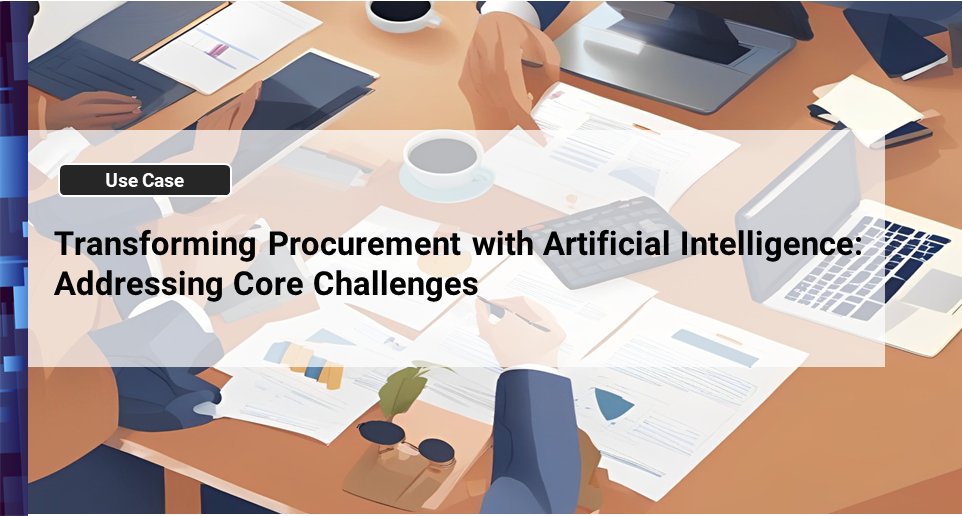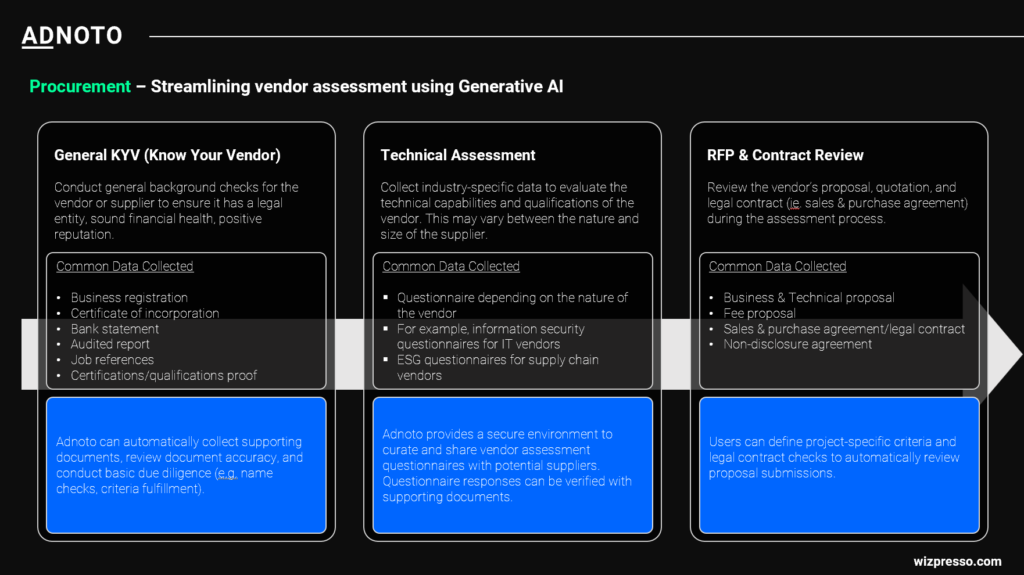
Procurement, the cornerstone of corporate strategy, significantly influences the bottom line. In the rapid tempo of contemporary business, mastering procurement processes becomes imperative for securing operational excellence, steadfast compliance, and financial success.
Insights from the Deloitte 2023 Global Chief Procurement Officer (CPO) Survey, supplier-related compliance was identified as having a significant impact, with 40% of respondents reporting contract compliance failures and 25% highlighting broader supplier non-compliance.
In this use case, we will explore how artificial intelligence (AI) can revolutionize procurement, focusing on three core areas: Request for Proposal (RFP), contract review, and onboarding.

Redefining the RFP Process
Selecting the right suppliers is a decisive element in the procurement process, yet given the extensive supplier market, it tends to be time-intensive. A ProcureCon Pharma conference survey highlights the issue, revealing that 83% of the search process can take one to six weeks to identify a suitable supplier.
The traditional RFP process can prove to be complicated and time-consuming. Suppliers submit detailed responses to company-specific questionnaires, and procurement teams diligently scrutinize this data to determine the optimal vendor. However, this standard approach has shortcomings—it’s a lengthy procedure and prone to human error, which risks potentially compromising supplier selection.
Artificial intelligence has transformed this process through its powerful data processing capabilities. By autonomously evaluating proposals against tailored criteria, AI equips procurement professionals with the capacity to parse through data accurately and swiftly, isolating prime supplier candidates. This brisk, precise decision-making process tremendously bolsters efficiency in operations.
Accurately Streamlining Contract Review
Contract review is a pivotal function within procurement departments, necessitating a deep dive into legal documents to ensure they meet organizational protocols.
One of the pain points in contract reviews is the risk of missing key details or clauses.
Conventional review methods demand considerable time and focus, as negligence in identifying key contract facets, such as involved parties, pertinent dates, or critical deadlines, can incur significant compliance failings and legal repercussions. A centralized system for contract management can simplify tracking.
Artificial intelligence utilizes advanced natural language processing (NLP) algorithms to swiftly and accurately analyze contract terms. This capability significantly reduces the labor-intensive nature of the review process, enabling procurement teams to allocate resources strategically.
Accelerating Supplier Onboarding
Supplier onboarding, also known as supplier or contractor onboarding, involves gathering information to qualify, approve, and contract with third-party organizations. Ensuring potential suppliers comply with relevant laws, regulations, and internal standards is crucial for informed purchasing decisions but is rife with challenges. However, several factors make supplier onboarding challenging.
A notable issue is the lack of universal supplier standards, complicating the evaluation process. Without defined criteria, there is a risk of selecting suppliers that do not meet expectations, potentially leading to delays and substandard quality.
Additionally, fragmented and incomplete supplier information can disrupt integration into pre-existing systems and workflows. This lack of comprehensive data complicates assessments of vendor service compatibility with operational needs and can hinder effective risk management, increasing vulnerability to compliance issues.
Traditional supplier onboarding processes involve extensive document checks and verifications, leading to integration delays. Artificial intelligence swiftly addresses this challenge by employing advanced verification techniques to validate vendor credentials against regulatory and organizational benchmarks. This accelerated onboarding process enhances the efficiency of procurement cycles and fosters a dynamic and responsive supply chain network.
Elevating Procurement with Artificial Intelligence: A Seamless Transition From Tradition
Traditional procurement processes are labor-intensive and prone to human error, resulting in inefficiencies and potential compliance risks. In contrast, AI leverages automation, advanced analytics, and machine learning to improve speed, accuracy, and compliance. By processing information in seconds, tasks that would otherwise take hours or days, AI expedites workflows and significantly reduces errors, ensuring a higher level of due diligence and supervisory compliance.
The Result: The Procurement Landscape of the Future
Incorporating AI into procurement ushers in a realm of transformative outcomes:
- Operational efficiency and cost-effectiveness: AI-driven processes significantly reduce time spent on RFP evaluation, contract review, and supplier onboarding. This eliminates redundancies, minimizes human errors, reduces labor costs and operating expenses, and enhances overall cost efficiency.
- Document Management: AI simplifies the entire scope of document management by digitally consolidating supplier-related documents. By offering a robust platform for the secure storage, retrieval, and tracking of documents, AI significantly reduces the reliance on cumbersome manual paperwork, thereby streamlining administrative tasks and driving efficiency.
- Enhanced compliance: AI’s precision in document validation and ensuring compliance with legal and regulatory benchmarks minimizes the peril of non-compliance, safeguarding organizations against potential fines and legal entanglements.
- Mitigating Supplier Risk: AI effectively mitigates the risks associated with third-party vendors by establishing precise criteria for supplier selection, rigorous compliance verification, and risk assessments.
- Growth and success: Standardizing the onboarding process enables organizations to scale, onboard more vendors, and achieve overall success.
- Continuous Improvement: AI facilitates an environment of perpetual refinement in onboarding procedures, enhancing the collection and utilization of supplier information, and fostering robust business relationships with both new and longstanding suppliers.
Conclusion:
Artificial intelligence is revolutionizing procurement by addressing core RFP, contract review, and supplier onboarding challenges. Leveraging AI’s data processing capabilities streamlines supplier selection, improves operational efficiency, and expedites decision-making. AI-powered contract review automates analysis, reducing time and effort while minimizing the risk of overlooking critical details. Additionally, AI accelerates supplier onboarding by swiftly validating vendor credentials against benchmarks, ensuring compliance, and fostering a dynamic supply chain network. Integrating AI brings transformative results, including operational efficiency, cost-effectiveness, enhanced compliance, improved document management, and better supplier risk management. Organizations can achieve procurement excellence with AI’s support by continuously refining processes and building strong relationships with suppliers.
Learn more about our document automation tool, Adnoto: https://wizpresso.com/KnowledgeManagement/Adnoto